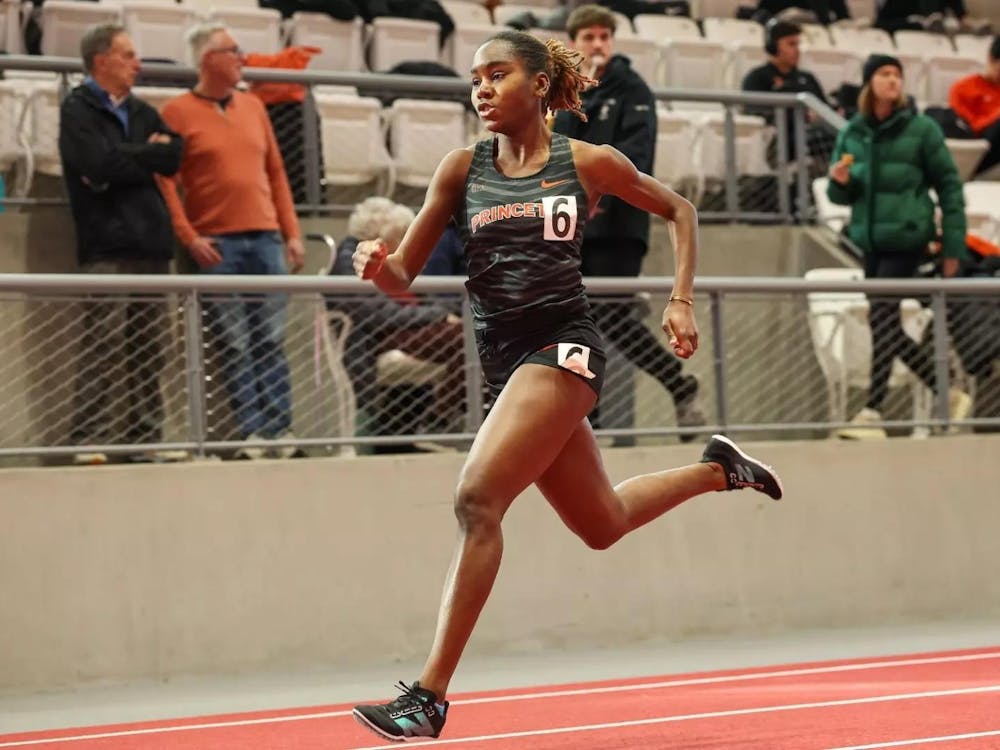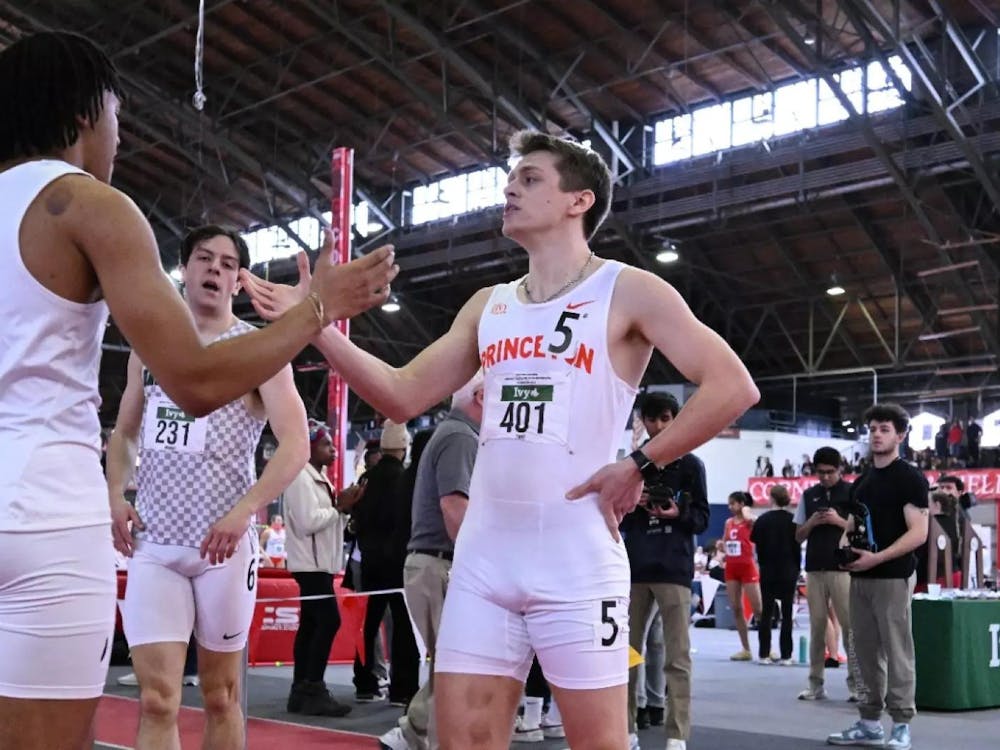Sitting on the fuzzy, peach-colored sofa that wraps around a corner of his 134-square foot Scully Hall single, Dennis Norman chatted with his girlfriend and his mother — and waited. He had borrowed a cable cord from the guy next door so that he could watch the telecast. The television was on, but they tried not to watch.
The trio talked about lots of things, idle things — but they didn't mention what was being televised on ESPN2. They tried to mute out the astute commentary of Mel Kiper and all the hoopla of the National Football League draft.
It had been a full year since the scouts started talking to Norman. The offensive tackle had been measured, weighed, tested, questioned, recorded, worked out and drilled by a score of NFL franchises through the year. In the days before the draft, at least a dozen teams had called him again to express their interest in the senior.
But on Sunday, April 22, all this six-foot, four-inch, 307-pound man could do was sit on a fuzzy, peach-colored sofa with his mother and his girlfriend — and wait for the phone to ring.
Early in the sixth round, the phone finally did ring. The Seattle Seahawks were calling. The man on the other end of the line chatted with Norman for a while — about school, his family, even the weather, but not about joining the team.
"They kept me on the phone in case somebody else was going to call," Norman says. "You could tell they were stalling."
The Seahawks chose someone else in the sixth round, but they succeeded in keeping the rest of the NFL from talking to Norman on draft day. In the seventh round, the Seahawks selected him as the league's 222nd pick and the first Princeton player to be drafted since Jason Garrett in 1990.
Playing a position without any statistical measure, Dennis Norman stood out during his collegiate career. The co-recipient of the 2000 Poe-Kazmaier Trophy as the football team's most valuable player, he also became only the fourth player in Princeton history to be a first-team All-Ivy League selection three years in a row.

For all that he brought to the football team in athleticism and leadership — as well as his achievements as a discus thrower and shot putter for the track and field team — Dennis Norman was named The Daily Princetonian Male Athlete of the Year at the annual 'Prince' banquet Monday night.
Norman's Princeton athletic career didn't begin with a bang. It started with a break. In the midst of a typical play in an early practice his freshman fall, half of the Tiger offense toppled onto each other like dominoes, eventually collapsing on Norman's lower leg.
After a discontented winter of rehabilitation for the broken fibula, Norman quickly made his mark for the track team that spring. He established himself as the team's best discus thrower with a launch of 162 feet at the outdoor IC4As. The following year, Norman topped the Ivy League with a discus victory at the Heptagonal Championships — a personal best of 170 feet. In 2000, Norman again surpassed his mark and claimed the Heps crown in the discus.

And then on April 21 of this year, Princeton hosted a tune-up meet at Weaver Stadium as a preparation for Penn Relays and outdoor Heps. Norman won two events with a personal best in the shot put and continued domination of the discus. The performance foreshadowed well for more success at Heps. But that meet at Weaver Stadium would be Norman's last. The next day he was drafted by the Seahawks. He would have to miss Heps in order to join his new team for spring mini-camp.
Chiseled through years of weight training, Norman is a physical presence so impressive that his Princeton teammates jokingly dubbed him "The Freak" — as in freak of nature. But since he's short on playing experience beyond the Division I-AA backwaters of the Ivy League, some have questioned how far Norman will make it in the NFL. He felt this sentiment before the draft at the scouting combine in Indianapolis in February.
"They think that the Ivy League is a lesser level of football," Norman says. "[The combine] was a big opportunity for me, and it was definitely a time for me to showcase that I could play at that level. I think I did fairly well."
Indeed, he did. Norman had the fastest 10-yard dash time and the highest vertical leap of any offensive lineman in the draft. He also ran the second-fastest 20-yard dash and fourth-fastest 40 and lifted 225 pounds on the bench press 25 times — the tenth most at his position.
Norman's sheer athleticism helped him to secure a draft slot, but it will only take him so far in training camp. Any margin for error he enjoyed in the Ivy League will evaporate among the speedy competition of the NFL. What does it take to make it?
"It encompasses a lot of things," Norman says. "It's foot speed, foot quickness, mobility, the strength of your punch, the ability to stay in front of people, to move laterally, the ability to pick up blitzes and stunts. It's intangibles — the ability to be nasty, to recover from a missed assignment. It's not really a statistical thing — it's intangibles."
Norman's last season in a Tiger football uniform was the best demonstration of his NFL potential and his best preparation for the vicissitudes of the NFL. Norman and his fellow seniors had to adjust to a new season under new coaches and a completely new offensive system. Head coach Roger Hughes had to turn to Norman and the other seniors to help the younger players through the transition.
"We had to be the ones to pick up the stuff the fastest to help bring the younger guys along," Norman says. "At times it was difficult, but it had to happen."
Compounding the problem of learning a whole new system was the challenge of adjusting to a new signal caller practically every week, as injuries sent quarterback after quarterback to the sidelines. With each new quarterback came a new cadence, a new rhythm to which the offensive line was forced to adjust.
"It was a new experience," Norman says. "It's something I've gone through. It's all about making adjustments, reacting to different situations, and I think it was good for us to go through."
Through the season, Norman demonstrated time and time again his sheer athletic dominance against Ivy League competition. Hughes recalls one moment against Columbia when Norman was matched up against the Lions' first team All-Ivy League outside linebacker Kirby Mack. As Mack tried to sneak past the Princeton line and blindside the quarterback for a sack, Norman stopped him cold in the neutral zone, wedged his hand under Mack's shoulder pad and literally lifted the 235-pounder into the air.
"On the field, he was so athletic that we could give him any assignment, and he could get it done," Hughes says. "His athleticism was outstanding. He's just a raw talent. He hasn't come to the point where he's matured as a player."
Because of the injury he suffered as a freshman and the spring practices he missed while devoting his efforts to track, Dennis Norman is very young as a football player. He has the one quality that pro scouts drool over — upside. Webster's doesn't list it, but it is the cardinal word in the vocabulary of the NFL draft. It means potential. It means a possession of the raw athletic attributes that can be honed into football prowess. For Dennis Norman, it means a chance to play in the National Football League.







